Happy Monday, and welcome to the seventeenth edition of Waco Can’t Wait, a progressive newsletter focusing on McLennan County, Texas, and Federal politics. I appreciate y’all’s patience over the past month. In the midst of the world turning upside down, my wife and I have been in the process of moving to a new place. Somewhere there in the middle, we also took a cruise with our family.
I have been very nervous to write this piece due to the gravity of the situation. This extremist Supreme Court has stripped women of a constitutional right that has been in place for almost 50 years. The right to bodily autonomy is no more, and Republican-led state governments have been given carte blanche to carry out a collective assault on women’s reproductive rights.
This is only the beginning. The larger right to marry who you choose, how you have sex, and how you deal with the consequences of that sex is in jeopardy. Justices like Clarence Thomas have suggested we should reconsider all unenumerated rights, which could turn back the clock on LGBTQ+ rights and the right to contraception. In addition to the extreme abortion laws coming down the pike, some states are considering bans on certain forms of birth control and in vitro fertilization.
The Pro-Choice movement has entered a new chapter. While the right to an abortion has been under attack since Roe v. Wade was decided in 1973, this new moment requires us to support our existing abortion care infrastructure, expand access in politically friendly states and municipalities, and fight back in states that have criminally sanctioned abortion. In this piece, I will take a more detailed look at the Dobbs v. Jackson Women’s Health Organization opinion, provide an overview of the state and national landscape, and share how we can advance reproductive rights in Waco.
Dobbs v. Jackson Women’s Health Organization (2022)
Justice Alito’s Majority Opinion
This case concerns the constitutionality of Mississippi’s 15-week abortion ban. This law was challenged by Jackson Women’s Health Organization, which at the time was Mississippi’s only abortion clinic (also known as the Pink House). In light of recent events, Jackson Women’s Health Organization has closed its doors.
This opinion held, in unambiguous words, that “the Constitution does not confer a right to an abortion; Roe and Casey are overruled; and the authority to regulate abortion is returned to the people and their elected representatives.”1
Instead of reaffirming the ruling in Casey based on stare decisis (a legal principle that encourages courts to align their decisions with precedent), Alito decides to make his own assessment as to whether or not there is a constitutional right to an abortion. While the constitution makes no express mention of abortion, the Casey Court found that “the right to an abortion is part of the ‘liberty’ protected by the Fourteenth Amendment’s Due Process Clause.”2
When the Court decides whether a right falls under the Due Process Clause, it must consider whether the right is “deeply rooted in [our] history and tradition” and whether it is essential to this Nation’s “scheme of ordered liberty.” Alito quickly concludes that our Nation’s history provides no right to an abortion.
Looking to English common law, Alito points out that abortion was largely criminalized after the “quickening,” the point at which you can feel the baby moving. Furthermore, Alito argued that even pre-quickening abortion may have been illegal in some cases. Looking closer to when the 14th amendment was passed, “three-quarters of the States had made abortion a crime at any stage of pregnancy.” Protections for abortion would not arrive at the state level until the years preceding the passage of Roe. Having considered all of this, Alito concludes that the right to an abortion is not deeply rooted in our history and that states have always had the right to regulate the procedure as they saw fit.
When Alito finally considers the right to an abortion in light of other precedents, he dismisses the right to an abortion being part of a broader right to autonomy and to define one’s concept of existence. He goes as far as to say that this criteria would “license fundamental rights to illicit drug use, prostitution, and the like,” as if there is some kind of moral equivalency.
Alito then asserts that the distinguishing factor between the abortion right and other rights used to support Roe and Casey is that abortion “destroys what Roe terms ‘potential life’ and what the challenged in this case calls an ‘unborn human being.’”
If I understand Alito’s reasoning, he believes that the Supreme Court should not be extending constitutional rights when the central question of the matter might implicate some kind of profound moral question. In this case the critical moral question is abortion, but many of these other cases posed critical questions of same-sex marriage, interracial marriage, or who you can have sex with. In all those cases, the Court asserted that the moral or ethical question was immaterial, and that the constitution takes the side of liberty and freedom.
Alito defends his decision to ignore stare decisis and overturn Roe and Casey. Alito argues that Roe had weak constitutional support and reasoning, that its trimester framework (followed by a viability standard in Casey) was arbitrary, and that it has proven to be unworkable. He also provides assurances that this Court is not coming after other unenumerated rights (at least not in this decision).
With respect to the government’s argument that women have come to rely on this decision, Alito’s cruelty and indifference borders on sadism. Alito concludes that women’s reliance on abortion is immaterial to this constitutional analysis, and that Courts should not make such considerations.
Finally, Alito dismisses any criticisms levied towards the Court that this might be in any way a political decision. This is without mentioning the new 6-3 conservative majority on the Court, three of whom were appointed by an unpopularly elected President who pledged to pick judges who would overturn Roe. Alito closes the opinion by reiterating that abortion is no longer protected by the Constitution, and that future abortion regulations that come before the Court will be granted a high degree of discretion.
Justice Thomas’ Concurring Opinion
While Thomas agrees with the majority opinion that there is no right to an abortion in the Constitution, he writes separately to advance his opposition to all substantive due process rights. One of Thomas’ longtime hobbyhorses has been that the Due Process Clause only guarantees procedural rights, and not substantive rights. By this logic, “because the Due Process Clause does not secure any substantive rights, it does not secure a right to abortion.”
In Thomas’ mind, the Court should reconsider all of its substantive due process jurisprudence, including the right to:
obtain contraceptives;
engage in private, consensual sexual acts; and
marry someone of the same sex.
A notable omission from this list of rights provided by Thomas is the right to marry a person of a different race, which is interesting considering his interracial marriage. It would appear that Thomas’ freedom to strip other people of longstanding constitutional rights ends where his nose begins.
Thomas suggests that after overruling these decisions, the Court should consider which of these rights might offer “privileges or immunities of citizens of the United States” protected by the Fourteenth Amendment. The advancement of the Privileges and Immunities (P&I) Clause has been one of Thomas’ longtime projects.
Why is Thomas’ P&I advocacy relevant? Well, the P&I clause only applies to citizens, not all people. If Thomas had his way, all of the enumerated constitutional rights would apply to the states through the P&I clause, which would allow states to deny constitutional guarantees to noncitizens. While this has been a fringe theory of Thomas’ for a long time, Justice Gorsuch recently signaled his support for this legal theory in Timbs v. Indiana.
While the legal conclusions reached in Justice Thomas’ concurrence lack the support of the entire Court, his legal theories are ascendent in and outside of the Court.
Justice Kavanaugh’s Concurring Opinion
Kavanaugh’s concurring opinion is mostly him spinning his wheels. That said, there are a couple of important nuggets that could be important for future jurisprudence:
Kavanaugh completely rules out that the Court should outlaw abortion in the United States. This legal theory has been called a “fetal right to life” or “fetal personhood.” This is the idea that “every fertilized egg is entitled to full protections of the law, and is a constitutionally-protected entity separate from the pregnant person.” Alito gave some credence to this theory when he adopted Mississippi’s use of the term “unborn human beings.” This theory could open a whole new can of worms, so it is at the very least encouraging that Kavanaugh is not buying it.
Kavanaugh provides some assurances that the overturning of Roe does not mean the overruling of other issues involving marriage and contraception. Furthermore, Kavanaugh pours cold water on any future state that might bar a resident from traveling to another state to get an abortion, citing the constitutional right to interstate travel.
Chief Justice Robert’s Concurring Opinion
Chief Justice Robert’s concurring opinion departs from the majority not in judgment, but in the way that he reaches the same conclusion. Rather than totally overturning Roe and Casey, Roberts answers the more narrow question of “Whether all pre-viability prohibitions on elective abortions are unconstitutional?” On this question, he answers no and defends the Mississippi law.
Though Roberts may have wanted to see the right to an abortion reversed in the longterm, he seems to think a more measured approach would be better for the Court’s reputation. How noble.
In this opinion, we can see that Chief Justice Robert has completely lost his grip on this Court. With the death of Justice Ginsburg and appointment of Justice Barrett, Robert’s conservative-leaning swing vote, if you can even call it that, was reduced to irrelevancy. The man who dismantled the Voting Rights Act has now been outgunned by the most conservative Supreme Court in the modern era.
Justice Breyer’s Dissenting Opinion
Talk about a grand exit. In one of Justice Stephen Breyer’s final opinions as a Supreme Court Justice, he did not pull any punches. Reflecting on the impact Roe and Casey has had on women’s lives, he wrote that “respecting a woman as an autonomous being, and granting her full equality, meant giving her substantial choice over this most personal and most consequential of all life decisions.”
Looking to the future, Breyer writes that states may now “force [a woman] to bring a pregnancy to term, even at the steepest personal and familial costs.” In many states, Breyer points out, these outright bans will not include exceptions for rape or incest. In states like Texas, a young girl raped by her father would be prohibited from seeking an abortion. Though this law does create a narrow exception for the life of the mother, this exception does not apply to pregnant women who threaten to harm themselves. This means that this same young girl could threaten suicide or say that she will have an abortion performed in a back alley, and the physician still cannot do anything to help her.
While most of the opinion is a point-by-point refutation of the majority opinion, Breyer’s most cutting comment is when he says that “the Court reverses course today for one reason and one reason only: because the composition of this Court has changed,” and that “today, the proclivities of individuals rule.” As important as the larger analysis is, I think this quote cuts to the heart of the matter.
When Roe was decided, five of the seven justices in the majority opinion were Republican appointees (three of those were appointed by Nixon). In the minority, you even had a single Democratic appointee dissenting. These men were clearly not guided by a decades long ideological project. They used existing Supreme Court jurisprudence and their collective wisdom to determine that, in the early stages of pregnancy, women have a superior interest to the state to terminate a pregnancy.
The decision of this 6-3 majority to overturn Roe and Casey is the product of a 50 year campaign by conservative Christians and the Federalist Society to reverse this decision, and their advocacy has been the biggest contributor to the Court’s politicization.
Justice Breyer, who has long been an ardent defender of the Supreme Court and its internal deliberations, has finally come to his senses. The Supreme Court is no longer calling balls and strikes. We are in an era where we can predict, with a high level of confidence, how the Court will rule simply by asking whether a ruling will be better for Republicans or Democrats.
What is happening in Texas?
Rather than taking a broad look at what is happening across the country, I am going to narrow my focus solely to Texas. In my opinion, Texas is the epicenter of the national fight to preserve abortion access, and much of what is happening here is happening across the country in Republican-led states.
What is the current legal landscape in Texas?
Along with thirteen other states, Texas has passed a total abortion ban that will only go into effect on the 30th day after the Supreme Court issued a judgment wholly or partly overruling Roe and Casey. As I mentioned before, this law provides no exceptions for rape or incest, and the provision for the life of the mother leaves a lot to be desired.
Who is subject to criminal prosecution in Texas?
While this law makes it explicitly clear that none of the criminal, civil or administrative penalties apply to pregnant females, any other person who knowingly performs, induces, or attempts an abortion could be looking at a second degree felony (a first degree felony if the child dies as a result of the offense) and a civil penalty of at least $100,000 per offense. The penalties in this bill do not preclude this conduct from being subject to a civil suit under the bounty hunter law passed last session. Lastly, physicians run the risk of losing their license if they violate the provisions of this bill.
That said, this law may not stop opportunistic prosecutors and police departments from coming after women who have miscarriages, who are seeking an abortion, or who self-induce an abortion. In Starr County, Democratic (no, seriously) District Attorney Gocha Allen Ramirez charged Lizelle Herrera with murder after she self-induced an abortion. Herrera spent three days in jail on a $500,000 bond before she was bailed out. The case has now been dismissed after the DA’s office reviewed the law.
Other states have resorted to charging women with manslaughter for miscarriages that are deemed to be their fault.
What is being done legally and politically to fight back?
Two weeks after the Supreme Court issued the Dobbs opinion, President Biden administered an executive order to protect access to abortions nationwide.3 Some of the most important provisions include:
Protecting access to medication abortion;
Ensuring emergency medical care, as guaranteed by the Emergency Medical Treatment and Labor Act;
Protecting sensitive health information, especially after reports that some period tracker apps sell personal health data that could be requested or purchased by law enforcement; and
Guaranteeing abortion access for service members, Department of Defense civilians, and military families as required by federal law.
The Biden administration has since provided guidance that “federal law requires doctors to perform abortions for pregnant people in emergency rooms when it is ‘the stabilizing treatment necessary’ to resolve a medical emergency, including treatments for ectopic pregnancy, hypertension and preeclampsia.”
Texas Attorney General Ken Paxton has filed suit in federal court to challenge the guidance, arguing that Biden’s administrative guidance is an “attempt to use federal law to transform every emergency room in the country into a walk-in abortion clinic.” This is only the beginning of the thorny legal questions that will come as states and the federal government clash between one another over abortion access.


In the campaign realm, Texas Democrats are benefiting from a surge in financial contributions from voters concerned about access to abortion. On Friday, Gubernatorial Candidate Beto O’Rourke announced a $27.6 million haul between February 20th and June 30th. This is the largest amount of money a Texas candidate has raised in a campaign financing period in history.
And in the horse race for Governor, Lieutenant Governor, and Attorney General, the races remain in fairly competitive territory.

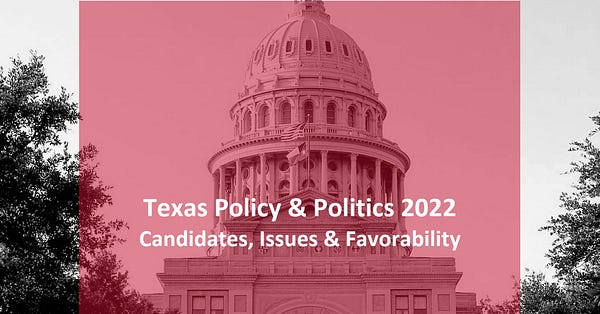
At the national level, the generic congressional ballot has moved in Democrats’ favor. On June 24th, Republicans held a 2.3% lead in an aggregate of recent polling. As of July 17th, that number has narrowed to 1.7%, with some polls showing Democrats with a lead as high as 4%.
What could the future look like after this next legislative session?
State Representative Briscoe Cain and the Texas Freedom caucus have provided an early blueprint for the 2023 legislative session. In a letter to Sidley Austin LLP, a law firm in DFW, the Freedom Caucus threatened legal action for the firm’s reimbursement of travel costs for employees leaving Texas to seek an abortion.
In the letter, the Caucus cites a statute from 1925 prohibiting any person from “furnishing the means for procuring an abortion knowing the purpose intended.” This statute was never repealed following Roe and carries criminal liability.

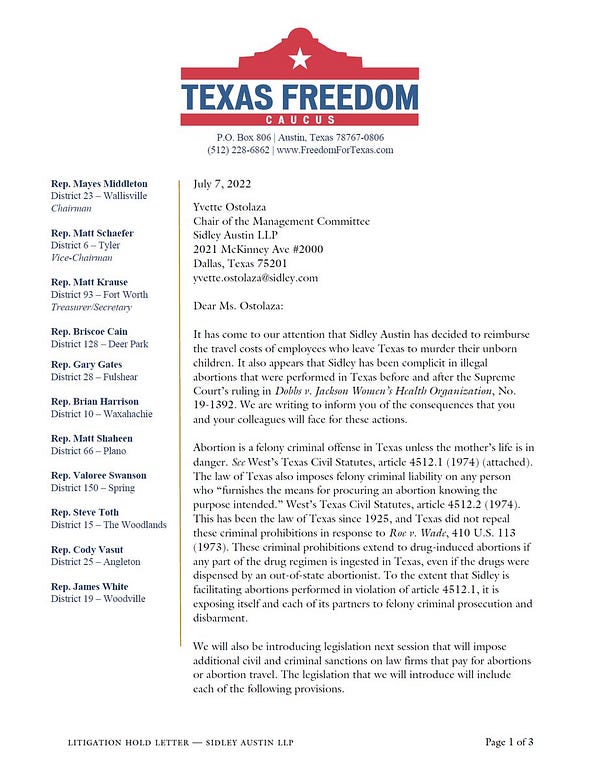
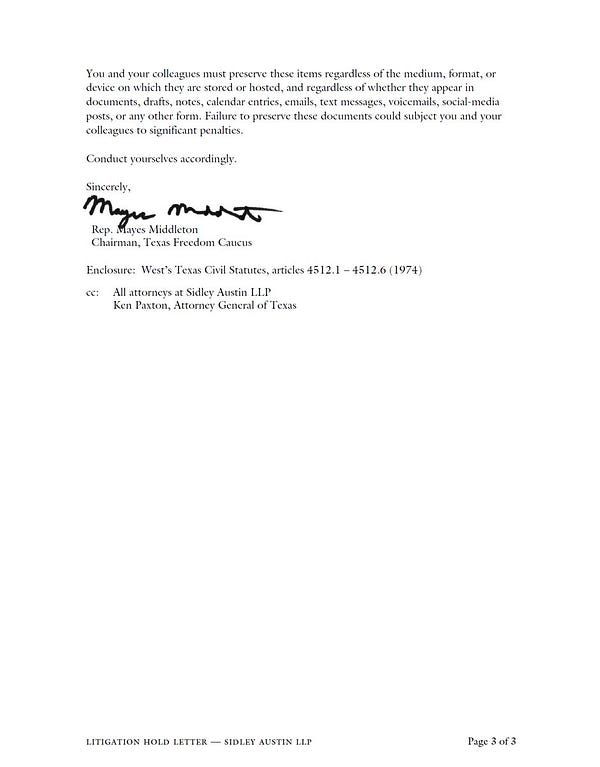
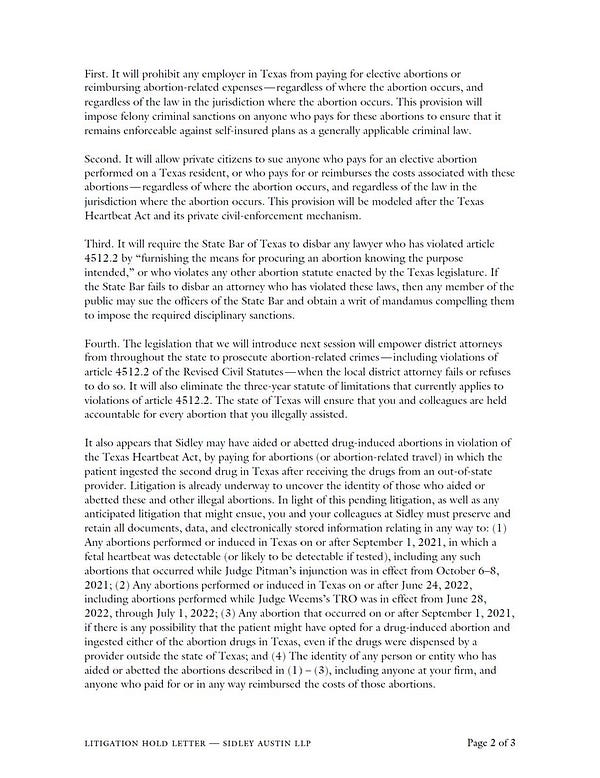
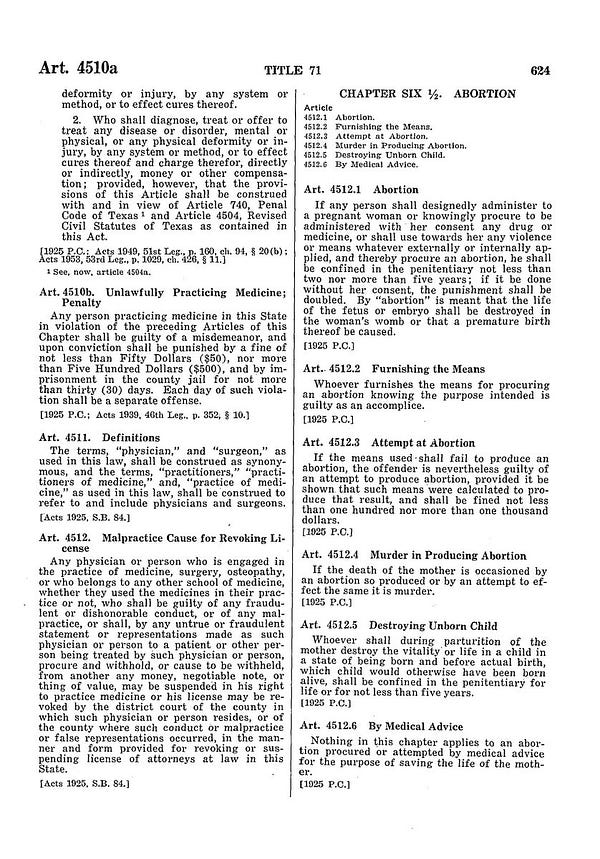
The letter went on to say that they would introduce legislation next session that would:
Prohibit employers in Texas from paying for abortions or reimbursing abortion-related expenses;
Allow private citizens to sue anyone who pays for an elective abortion performed on a Texas resident;
Require disbarment of any lawyer who violates any abortion statute enacted by the Texas Legislature; and
Empower district attorneys throughout the state to prosecute abortion-related crimes when local district attorneys decline to prosecute.

The legislation on district attorneys is likely a response to a group of Texas DAs vowing not to prosecute abortion-related cases. Whether or not the Legislature could authorize DAs across the state to prosecute abortions outside their jurisdiction, and what that process looks like, remains to be seen.
What can we do in Waco?
We are lucky to have a recently-formed reproductive rights advocacy group: Pro-Choice Waco! Pro-Choice Waco (PCW) is a pro-choice community that collaborates with reproductive justice organizations, legislators, faith communities, and nonprofit groups to advance the equal rights and personhood of all pregnant people including those most likely to be targeted for arrest, detention, and blame in Waco, Texas.
Its work encompasses the creation of ordinances or resolutions to protect abortion access, as well as provide public education among the diverse communities that are stakeholders in these issues, including their families in our community. Volunteer opportunities will include serving on projects, joining committees, organizing and/or joining protests, speaking with legislators, and sharing accurate info with people who are seeking abortion services.
PCW will be having a meeting TODAY, July 18th from 7:00-9:00 pm at Cricket’s Draft House and Grill, 211 Mary Ave, Waco, Texas 76701. If you would like to attend, email prochoicewaco@gmail.com to RSVP. Speakers will include the following individuals:
Hope Mustakim, NextGen America, will share her local efforts to register new voters;
Mary Brooks, PCW, will discuss website development;
Aubrey Robertson, Democratic candidate for DA and newly appointed Assistant District Attorney for McLennan County, will address Texas’ trigger law and other planks from the campaign platform. Website: www.AubreyForDA.com; and
I will chat about an opportunity for a ballot initiative on abortion decriminalization.
PCW will also be voting on elected roles during the meeting, including representative, media/digital organizer, secretary, treasurer, policy fellow, community engagement organizer, and fundraiser. If you believe that this Supreme Court decision has gone way too far, then you need to be in attendance at this meeting. This political and societal moment requires us to create community around this issue, educate the public, and advance this cause at the ballot box.
I understand that many of you are very scared. We are entering a new era of American life that will require us to fight like hell to defend all of the liberties that we hold dear. At the core of this fight is our freedom to choose if, when, and how we form our families and organize our lives. This decision and the laws to follow are all about the government exerting as much control over people’s private lives as possible.
We will find our strength when we come together in common cause. This work will be tiresome, and I fear that this situation may only grow worse before it can get better. That said, we can make it through this if we all work together. We need to speak up for what is right and stand by those who desperately need our help. I hope y’all can make it, and I ask that y’all do what you can to uplift this cause in the coming years. We all have a platform to speak from; we just have to use it.
This clear language was a boon for conservative states with trigger laws in place. These trigger laws were written so that a total ban on abortion would go into effect right when the Supreme Court overturned Roe and Casey. There was some debate as to what this process would look like if the Court issued a more incremental opinion, but Alito did all these folks a favor by explicitly stating that these opinions were overturned. How kind of him.
While some have argued that the right to an abortion also springs from the Fourteenth Amendment’s Equal Protection Clause, the Court in the past has found that the regulation of abortion is not a sex-based classification. This means it is not subject to a heightened level of scrutiny. This makes no mention of the fact that only certain people can get pregnant.
Biden has also called for the codification of the protections in Roe, and has suggested that there should be an exception to the filibuster to pass these protections.



